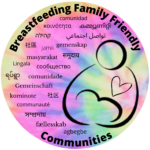In Carrboro, North Carolina, a dedicated team of public health graduate students embarked on a year-long journey to help Carrboro move closer to completing the Breastfeeding Family Friendly Community designation. The Breastfeed Orange NC team and Carrboro had the unique privilege of working with a University of North Carolina at Chapel Hill School of Public Health Capstone Team. The Capstone Team project had two areas of focus. One was to increase the number of lactation-friendly spaces through Town signage (Step 2) and business participation as Community Partners and Employers (Step 7 and 9). Over the course of the year they increased their knowledge about the initiative and overcame a number of challenges, providing a blueprint for other communities with similar aspirations.
Beginning with a Vision
The initiative kicked off with a thorough self-appraisal, which involved evaluating Carrboro against the “Ten Steps to a Breastfeeding Family Friendly Community” criteria. This step was crucial as it laid the groundwork by identifying existing strengths and pinpointing areas needing improvement. The team’s dedication to understanding the full landscape of the community’s needs was the first step in a journey marked by collaboration and persistence.
Engaging Stakeholders
One of the significant challenges was engaging diverse stakeholders—from local businesses to educational institutions—each with their unique interests and concerns. Kennedy Bridges, leading the outreach, focused on securing buy-in from local businesses, which was vital for establishing breastfeeding-friendly spaces throughout Carrboro. This effort required initial contacts and nurturing ongoing relationships, a task that demanded both patience and resilience.
Navigating Complex Policy Terrain
Collaboration with the Chapel Hill-Carrboro City School Board highlighted the initiative’s complexities. Bridget Nelson spearheaded the effort to integrate supportive lactation policies within schools, drafting proclamations and working tirelessly to ensure that breastfeeding-friendly curricula were adopted across all levels of education. The team faced substantial challenges in communication and policy alignment, learning that flexibility and adaptability were essential in dealing with institutional bureaucracies.
Building and Sustaining Momentum
Throughout the process, the team learned the importance of detailed documentation and regular reflection. These practices helped in keeping the project on track and also in capturing valuable lessons that could be shared with other communities and future teams. The slow but steady progress through various phases of the project taught them the value of persistence and the need to celebrate small victories along the way.
Carrboro’s journey towards becoming a Breastfeeding Family Friendly Community was filled with challenges and learning opportunities. The initiative’s greatest success was in how the community came together to support a significant cause. The lessons learned—from the importance of thorough initial assessments to the need for flexible and persistent outreach—serve as valuable insights for other communities aiming to create more supportive environments for breastfeeding families.
This story of Carrboro is a testament to the power of community-driven change, demonstrating that with determination, collaboration, and a clear understanding of local needs, communities can transform in ways that support and uplift all members, particularly breastfeeding families. Let’s continue to support and learn from each other, making our communities more inclusive and supportive for breastfeeding families.
